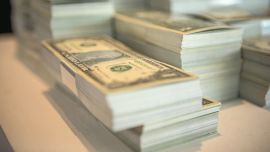President Javier Milei proposed an overhaul of Argentina’s tax system in order to cut red tape and encourage use of greenbacks that were previously undeclared.
The country’s tax agency, ARCA, will stop collecting large swathes of information from citizens and businesses, ranging from used car and home sales to everyday supermarket purchases, starting Friday. The government also aims to raise the threshold for banks to report consumer transactions.
Bank transfers below 50 million pesos (US43,700) will no longer need to be reported, well above the previous one million peso threshold and far more than the US limit of US$10,000. Withdrawals from automated tellers less than US$8,750 will also be exempt — while every transaction was previously logged. Used car sellers and real-estate agents will no longer have to submit those transaction details to the tax agency.
Starting June 1, the tax agency will also eliminate the requirement for Argentines to declare their assets in their statements, which will apply to the 2025 tax year.
“This regime change aims to give back liberty to the people,” Economy Minister Luis Caputo said Thursday at a press conference in the presidential palace, “and stop treating people who have had to seek refuge in informality as criminals.”
The government has been touting the announcement for weeks as a way to encourage the use of dollars held outside Argentina’s banking system. South America’s second-largest economy has had currency controls for nearly 10 years and has long penalised citizens for buying more than US$200 on the government-controlled exchange rate. It remains to be seen, however, whether it actually lures greenbacks out of wary Argentines’ safes after years of distrusting the financial system.
“To keep growing the economy at these levels – which are around six percent – we need the economy to remonetise. It’s almost more natural for that remonetisation to take place in dollars,” Caputo said. He estimates there are about US$37 billion worth of pesos in the economy and five to ten times as much in greenbacks.
The government’s push to incentivise dollar use is part of a strategy to boost stagnant consumer spending while keeping inflation – measured in pesos – low ahead of midterm elections in October. Caputo was flanked by the head of the ARCA tax collection agency, Juan Pazo, Central Bank Governor Santiago Bausili and Presidential Spokesman Manuel Adorni.
“Your dollars, your choice,” Adorni declared in his introductory remarks. “What’s yours is yours and you can spend and use it as you like, without having to demonstrate all the time where you got it.”
Milei also plans to send a bill to congress to shield taxpayers from being penalized for their participation in the new tax system retroactively, Pazo said.
The measures broadly reflect Milei’s campaign pledges to implement what he called a “competition of currencies” between dollars and pesos. Many Argentines interpreted his message as an intent to dollarise considering the peso’s infamous track record and after the libertarian hoisted dollar sign billboards with his face on them during the campaign. Since taking office, Milei has backpedaled from his most dramatic promises including closing the Central Bank, though he still floats it as a long-term goal.
Last month, Milei secured a US$20-billion aid package from the International Monetary Fund to lift most of the capital and currency controls he inherited. While traders were betting the policy change would come with a peso devaluation, the currency has instead strengthened between the government’s control bands. The peso’s long-running strength has made Argentina expensive in dollar terms, paving the way for the world’s second most expensive Big Mac (US$7) and Latin America’s priciest cup of coffee (US$3.50).
Caputo said the measures had nothing to do with the new agreement with the IMF, and added they had no estimate for how much money the change would bring into the system.
Argentina is a bi-monetary economy, where most citizens earn salaries in pesos but save in dollars, a historic reality after several crises, including the peso losing 99 percent of its value against the dollar over the past 10 years. It’s common for a bank checking account to be denominated in pesos with a savings account in greenbacks. Home sales are done in dollars and largely all cash as the mortgage market is just starting to revive under Milei.
Government officials estimate that Argentines hold over US$200 billion in US cash savings inside the country but outside the official banking system, either in tightly controlled safe deposit boxes and, more often “under the mattress and God knows where,” as IMF Managing Director Kristalina Georgieva quipped last month. “If this money comes out and it works for Argentina, just imagine what the country will be like.”
by Manuela Tobias & Patrick Gillespie, Bloomberg




















Comments